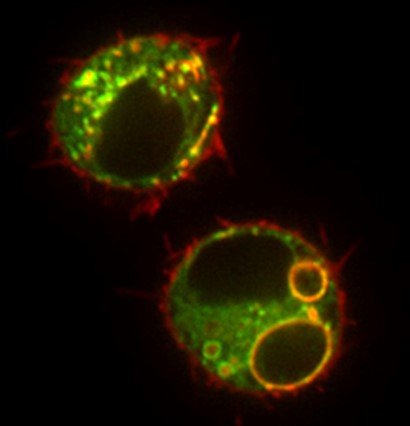
Cell Signaling in Response to Fungal Pathogens
Phagocytic cells (e.g., neutrophils, macrophages, and dendritic cells) are the first line of defense against invading fungal pathogens. Understanding the initial responses to invading pathogens and subsequent antifungal activity is essential to the development of new therapeutic strategies. We currently have two main projects focused on these initial responses: [1] phagosome formation and maturation in fungal immunity, and [2] neutrophil responses to Aspergillus following treatment with BTK inhibitors. This work has been funded by multiple grants (R01s and R21) from the National Institute of Allergy and Infectious Diseases (NIAID).
Phagosome Formation and Maturation in Fungal Immunity
Once phagocytes recognize and engulf fungal pathogens, they are placed into membrane-delimited compartments termed phagosomes. In a process known as phagosome maturation, ingested materials are trafficked through a series of increasingly acidified structures, ultimately leading to the degradation of the pathogen. The Vyas Lab uses fungal pathogens of clinical importance including Aspergillus fumigatus, Candida albicans, and Cryptococcus neoformans as the model pathogens to study phagosome formation and maturation. Using live-cell imaging, fluorescently tagged proteins, and genetic models we visualize primary innate immune cells and their responses to fungi. We examine the role of pattern-recognition receptors such as Dectin-1, Dectin-2, and Toll-like receptors (TLRs) as well as the tetraspanin CD82 in fungal immunity. Knowledge gained understanding these molecular events will hopefully tailor the immune response to these clinically relevant fungal pathogens in immunocompromised patients.
Neutrophil Responses to Aspergillus Following Treatment with BTK Inhibitors
Bruton’s tyrosine kinase (BTK) is a non-receptor kinase that has been implicated in B cell malignancies. As such, BTK inhibitors are increasingly utilized as therapies in those with chronic lymphocytic leukemia and mantle-cell lymphoma. Unfortunately, these patients are at increased risk of fungal infections. Thus, we seek to understand the impact of BTK inhibition on human innate immune cells, primarily neutrophils, in their ability to neutralize invading fungi. In tandem with our collaborators, Drs. Mansour, Irimia, and Hopke, we examine the functional changes in primary human neutrophils in the presence and absence of BTK inhibition. These investigations aim to identify novel therapeutic targets to reduce fungal infections in these patients.

